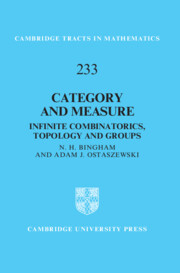Book contents
- Frontmatter
- Dedication
- Contents
- Preface
- Prologue: Regular Variation
- 1 Preliminaries
- 2 Baire Category and Related Results
- 3 Borel Sets, Analytic Sets and Beyond: Δ21
- 4 Infinite Combinatorics in Rn: Shift-Compactness
- 5 Kingman Combinatorics and Shift-Compactness
- 6 Groups and Norms: BirkhoffKakutani Theorem
- 7 Density Topology
- 8 Other Fine Topologies
- 9 CategoryMeasure Duality
- 10 Category Embedding Theorem and Infinite Combinatorics
- 11 Effros’ Theorem and the Cornerstone Theorems of Functional Analysis
- 12 Continuity and Coincidence Theorems
- 13 * Non-separable Variants
- 14 Contrasts between Category and Measure
- 15 Interior-Point Theorems: Steinhaus–Weil Theory
- 16 Axiomatics of Set Theory
- Epilogue: Topological Regular Variation
- References
- Index
5 - Kingman Combinatorics and Shift-Compactness
Published online by Cambridge University Press: 14 January 2025
- Frontmatter
- Dedication
- Contents
- Preface
- Prologue: Regular Variation
- 1 Preliminaries
- 2 Baire Category and Related Results
- 3 Borel Sets, Analytic Sets and Beyond: Δ21
- 4 Infinite Combinatorics in Rn: Shift-Compactness
- 5 Kingman Combinatorics and Shift-Compactness
- 6 Groups and Norms: BirkhoffKakutani Theorem
- 7 Density Topology
- 8 Other Fine Topologies
- 9 CategoryMeasure Duality
- 10 Category Embedding Theorem and Infinite Combinatorics
- 11 Effros’ Theorem and the Cornerstone Theorems of Functional Analysis
- 12 Continuity and Coincidence Theorems
- 13 * Non-separable Variants
- 14 Contrasts between Category and Measure
- 15 Interior-Point Theorems: Steinhaus–Weil Theory
- 16 Axiomatics of Set Theory
- Epilogue: Topological Regular Variation
- References
- Index
Summary
The KBD theorem is about embedding subsequences of shifts of a suitably regular set into some target set. Developing work of Kingman (1963, 1964), we extend this here to embedding into all members of a family of sets. Useful here is the idea of shift-compactness. We also begin to pass effortlessly between the category and measure cases by working bitopologically, using the Euclidean topology for the category case and the density topology (Chapter 7) for the measure case.
- Type
- Chapter
- Information
- Category and MeasureInfinite Combinatorics, Topology and Groups, pp. 78 - 85Publisher: Cambridge University PressPrint publication year: 2025

